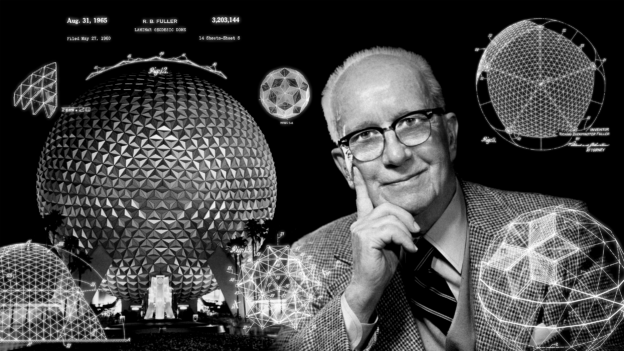Buckminster Fuller’s Ephemeralization: From Innovation to Information Overload
Contents
Introduction
Buckminster Fuller, an American architect, engineer, and futurist, introduced the concept of “ephemeralization” in the mid-20th century. This visionary idea referred to the ability of technology to do “more with less” over time, enabling us to accomplish increasingly complex tasks using fewer resources. While Fuller’s notion was groundbreaking, it is essential to explore its natural extension and the potential challenges that arise, such as information overload. This article examines the major arguments surrounding ephemeralization’s consequences and delves into Alvin Toffler’s concerns. Furthermore, we will discuss potential mitigation strategies to address the issues associated with information overload.
Buckminster Fuller’s Ephemeralization
Buckminster Fuller believed that human progress is intricately linked to the ability to achieve more with less. Ephemeralization encapsulated the idea that technological advancements would continuously enhance productivity, efficiency, and resource utilization. It celebrated the notion that as technology advanced, it would eliminate the need for redundant processes, leading to streamlined and efficient solutions.
Ephemeralization heralded a world where innovation and technological advancements would allow us to achieve incredible feats while minimizing waste and maximizing output. Examples of ephemeralization can be seen in various domains, such as Moore’s Law in computing, which predicts the exponential growth of computing power, or the development of lightweight and efficient materials that revolutionize transportation and construction.
From Ephemeralization to Information Overload
While ephemeralization offers tremendous potential, it is crucial to consider the unintended consequences that can emerge from its unchecked proliferation. As technology continues to advance, we find ourselves inundated with an overwhelming amount of information. The easy accessibility and continuous generation of data, coupled with the exponential growth of digital platforms, contribute to information overload.
Information overload refers to the overwhelming abundance of data that exceeds an individual’s capacity to process and absorb. It can lead to diminished decision-making abilities, reduced productivity, and increased stress. Alvin Toffler, a prominent futurist, cautioned about the perils of information overload in his book “Future Shock,” highlighting the negative impact it can have on individuals and society.
Mitigating Information Overload
Toffler’s concerns regarding information overload are valid, but they should not lead us to reject the concept of ephemeralization altogether. Instead, we must explore strategies to mitigate the adverse effects and harness the potential of this technological progression responsibly. Here are a few key approaches:
- Information Filtering and Curation: Developing effective algorithms and tools to filter and curate information can help individuals manage the overwhelming volume of data. Personalized recommendations, content filtering, and intelligent search algorithms can assist in presenting relevant information tailored to individual needs.
- Digital Literacy and Critical Thinking: Promoting digital literacy and critical thinking skills is vital to navigate the vast landscape of information effectively. Educating individuals on how to discern credible sources, fact-check information, and critically evaluate data will empower them to make informed decisions and avoid information overload.
- Mindfulness and Digital Well-being: Encouraging mindfulness practices and promoting digital well-being can help individuals strike a balance between technology use and mental well-being. Techniques such as digital detox, setting boundaries, and managing screen time can alleviate the negative effects of information overload.
- Collaborative and Shared Knowledge Platforms: Leveraging collaborative platforms and shared knowledge resources can help distribute the responsibility of managing information. By tapping into collective intelligence and collaboration, individuals can access filtered and verified information, reducing the burden of processing excessive data individually.
Thoughts
Buckminster Fuller’s concept of ephemeralization has undoubtedly revolutionized our world, propelling us towards achieving more with less. However, the natural extension of this concept has brought forth new challenges in the form of information overload. As technology continues to advance, the sheer volume of information available to us can become overwhelming, hindering productivity and decision-making.
Dealing with Information Overload today
Recognizing these challenges, it is essential to implement strategies to mitigate the adverse effects of information overload while still benefiting from the advantages of ephemeralization. By focusing on information filtering and curation, promoting digital literacy and critical thinking, fostering mindfulness and digital well-being, and leveraging collaborative knowledge platforms, we can navigate the digital landscape more effectively.
Filtering Tools
Effective information filtering and curation tools can assist individuals in managing the deluge of data. By employing intelligent algorithms and personalized recommendations, these tools can present relevant information tailored to individual preferences and needs, reducing the cognitive load associated with processing excessive information.
Digital Literacy
Promoting digital literacy and critical thinking skills is vital in today’s information-rich world. Educating individuals on how to discern credible sources, fact-check information, and critically evaluate data empowers them to make informed decisions and avoid being overwhelmed by misleading or irrelevant information.
Personal Well Being
Mindfulness practices and digital well-being initiatives play a crucial role in combating information overload. Encouraging individuals to practice digital detox, set boundaries on their technology usage, and manage their screen time can help maintain a healthy balance between engagement with information and mental well-being.
Working Together
Additionally, embracing collaborative and shared knowledge platforms allows us to distribute the responsibility of managing information. By tapping into collective intelligence and collaboration, we can rely on the expertise of others to filter and verify information, relieving individuals of the burden of processing excessive data individually.
Conclusion
In conclusion, while Buckminster Fuller’s concept of ephemeralization has paved the way for remarkable advancements, it is essential to address the challenges that arise from information overload. By implementing strategies such as information filtering and curation, promoting digital literacy, fostering mindfulness, and leveraging collaborative knowledge platforms, we can navigate the digital landscape effectively and harness the benefits of ephemeralization while mitigating the negative impacts of information overload. In doing so, we can create a future where technology empowers us without overwhelming us.
